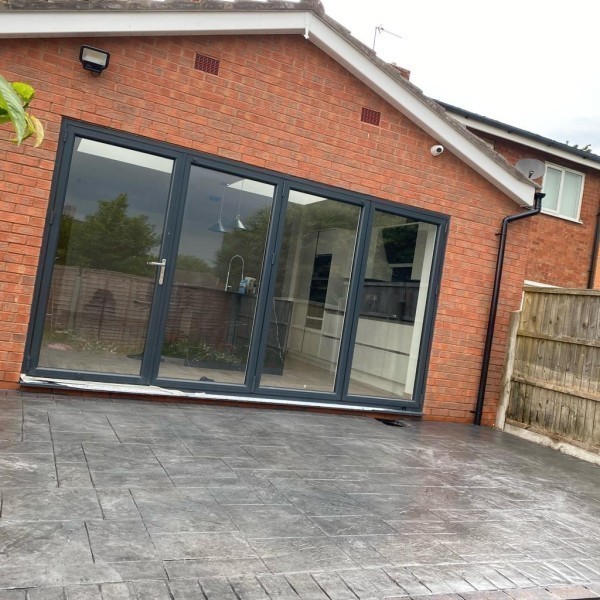Loft Conversions in Coseley
Manorwood Building Services Ltd is your go-to solution for all building and construction needs in Solihullread more »
Welcome to Jade Housing Services Ltd, your premier choice for comprehensive tradespeople services in Birmingham and the wider West Midlan... read more »
KBF Osborn Services: Your Trusted Tradespeople in Selly Oak and the West Midlands
Welcome to KBF Osborn Services... read more »
Welcome to Kalyssia Properties, your premier choice for top-notch building and renovation services in Four Oaks and the wider West Midlan... read more »
Welcome to Oakwood Carpentry and Building Ltd, your trusted builders in Knowle, offering a comprehensive range... read more »
EGECO House Development LTD: Premier Tradespeople in Chad Valley, West Midlands
Welcome to EGECO House Development... read more »
Welcome to Mitsu Construction Company Ltd, your premier choice for expert building services in Friar Park and the West Midlands... read more »
Bebuddy Group LTD: Your Trusted Builders in Lichfield and Staffordshire
Welcome to Bebuddy Group LTD, where we p... read more »
Staffordshire Construction Ltd is a premier construction company based in Dudley, offering top-notch building services a... read more »
Welcome to BM Builder, your go-to experts for all your building needs in the vibrant city of Birmingham and throughout the West Midlands.... read more »
Welcome to Premier Estates Home Improvements, your go-to experts in Ettingshall for all your building and landscaping needs. As a leading... read more »
Welcome to K F Builders Ltd, your trusted partner for all building needs in Stambermill and the wider West Midlands area. As a leading na... read more »
Welcome to CPL Building Services, your trusted partner for all construction needs in Golds Green and the wider West Midlands area. With o... read more »
M.sidhu Constructions Ltd is a premier construction company based in the vibrant area of Soho, offering a comprehensive... read more »
Welcome to Best Homes Builder Ltd., your premier choice for top-notch building services in Balls Hill and the wider West Midlands area. A... read more »
EVERBEST Home Builders is your go-to solution for all building and renovation n... read more »
Elegas Plus Ltd, located in the heart of Acock's Green, is your go-to solution for all your home improvement needs acros... read more »
Gabson Construction, based in the bustling city of Wolverhampton, is your premier choice for top-quality construction se... read more »
Welcome to K & T Construction (Midlands) Ltd, your premier choice for Builders, Extension Builders, Property Maintenance, Kitchen Install... read more »
NK Midlands LTD is a distinguished tradespeople business located in the heart of Black Lake, proudly serving the West Mi... read more »
Search Loft Conversions in places nearby
Understanding Loft Conversions in Coseley
Loft conversions in Coseley are becoming increasingly popular as homeowners look to maximise their living space without the hassle of moving. This process involves transforming an underutilised attic into a functional room, which can serve various purposes, from a bedroom to a home office. In this article, we'll delve into the ins and outs of loft conversions, providing a comprehensive guide to help you make informed decisions.
Benefits of Loft Conversions
Loft conversions offer numerous advantages, making them a worthwhile investment for many homeowners. Firstly, they add significant value to your property. By increasing the number of usable rooms, you enhance the home's appeal to potential buyers. Additionally, loft conversions are a cost-effective way to gain extra space compared to building extensions, which often require more extensive groundwork and planning.
Moreover, converting your loft can improve your home's energy efficiency. By insulating the roof space, you can reduce heat loss, leading to lower energy bills. Lastly, a loft conversion allows for customisation, giving you the freedom to design a space that meets your specific needs and preferences.
Types of Loft Conversions
There are several types of loft conversions, each with its unique features and suitability depending on your home's structure and your personal requirements. The most common types include:
- Velux (Rooflight) Conversion: This is the simplest and most cost-effective option, involving the installation of roof windows without altering the roof structure.
- Dormer Conversion: A popular choice, dormer conversions extend the existing roof to create additional headroom and floor space.
- Hip to Gable Conversion: Suitable for semi-detached or detached homes with a hipped roof, this conversion involves straightening the sloped side of the roof to create a vertical wall.
- Mansard Conversion: This type involves altering the roof structure significantly, creating a flat roof with steeply sloped sides, offering maximum space.
Planning Permission and Building Regulations
Before embarking on a loft conversion in Coseley, it's essential to understand the planning permission and building regulations requirements. Generally, loft conversions fall under permitted development rights, meaning you don't need planning permission if the work meets specific criteria. However, if your property is in a conservation area or the conversion involves significant alterations, you may need to apply for permission.
Building regulations approval is mandatory for all loft conversions to ensure the work meets safety and structural standards. This includes considerations for fire safety, insulation, and structural integrity. It's advisable to consult with a professional architect or builder to navigate these requirements effectively.
Design Considerations for Loft Conversions
Designing a loft conversion requires careful planning to make the most of the available space. Start by considering the purpose of the room. Whether it's a bedroom, office, or playroom, the intended use will influence the layout and design elements.
Lighting is a crucial factor in loft conversions. Maximising natural light through roof windows or dormers can create a bright and inviting space. Additionally, consider the placement of electrical outlets and lighting fixtures to enhance functionality.
Storage solutions are also vital in loft conversions, as sloped ceilings can limit traditional furniture options. Built-in wardrobes, shelving, and under-eaves storage can help maximise space and keep the room organised.
Choosing the Right Contractor
Selecting a reputable contractor is crucial to the success of your loft conversion project. Start by researching local builders with experience in loft conversions. Look for reviews and testimonials from previous clients to gauge their reliability and quality of work.
It's essential to obtain multiple quotes and compare them to ensure you're getting a fair price. Don't be swayed by the cheapest option; instead, focus on the contractor's experience, expertise, and ability to meet your specific needs.
Once you've chosen a contractor, ensure all agreements are documented in a contract, detailing the scope of work, timelines, and payment terms. This will help prevent misunderstandings and ensure a smooth project execution.
Cost of Loft Conversions in Coseley
The cost of a loft conversion in Coseley can vary significantly depending on the type of conversion, the size of the space, and the quality of materials used. On average, a basic Velux conversion may cost between £15,000 and £20,000, while a more complex Mansard conversion could exceed £40,000.
It's essential to budget for additional expenses such as planning fees, building regulations approval, and any unforeseen costs that may arise during the project. Consulting with a professional can help you develop a realistic budget and avoid financial surprises.
Timeline for Loft Conversions
The timeline for completing a loft conversion can vary based on the complexity of the project and the contractor's schedule. On average, a straightforward conversion may take 4 to 6 weeks, while more extensive projects could extend to 8 to 10 weeks.
It's crucial to discuss the timeline with your contractor and establish a realistic schedule that accommodates any potential delays. Regular communication with your builder can help ensure the project stays on track and is completed within the agreed timeframe.
Common Challenges in Loft Conversions
While loft conversions offer numerous benefits, they can also present challenges that require careful consideration. One common issue is limited headroom, which can restrict the usability of the space. This can often be addressed by selecting the appropriate type of conversion or adjusting the roof structure.
Another challenge is ensuring adequate insulation and ventilation. Proper insulation is essential for energy efficiency and comfort, while ventilation prevents moisture build-up and maintains air quality. Consulting with a professional can help address these concerns effectively.
Maximising Space in Your Loft Conversion
Making the most of your loft conversion space requires creative solutions and thoughtful design. Consider using multifunctional furniture, such as sofa beds or foldable desks, to maximise functionality without overcrowding the room.
Utilising vertical space is another effective strategy. Install shelves or cabinets that reach the ceiling to provide ample storage without taking up valuable floor space. Additionally, consider using mirrors to create the illusion of a larger, more open area.
Incorporating Sustainable Practices
Incorporating sustainable practices into your loft conversion can enhance its environmental impact and reduce long-term costs. Start by selecting eco-friendly materials, such as reclaimed wood or recycled insulation, to minimise your carbon footprint.
Consider installing energy-efficient windows and lighting fixtures to reduce energy consumption. Additionally, incorporating renewable energy sources, such as solar panels, can further enhance the sustainability of your conversion.
Legal Considerations and Insurance
Before starting a loft conversion, it's essential to address any legal considerations and ensure you have adequate insurance coverage. Check your home insurance policy to confirm it covers the conversion work and any potential damages.
Additionally, if your property is leasehold, you may need to obtain permission from the freeholder before proceeding with the conversion. Consulting with a legal professional can help you navigate these requirements and avoid potential legal issues.
Financing Your Loft Conversion
Financing a loft conversion can be a significant investment, but there are several options available to help manage the costs. Many homeowners choose to use savings or personal loans to fund the project. Alternatively, remortgaging your home or taking out a home improvement loan can provide the necessary funds.
It's essential to explore different financing options and choose the one that best suits your financial situation. Consulting with a financial advisor can help you make an informed decision and ensure you have a clear repayment plan.
Future-Proofing Your Loft Conversion
Future-proofing your loft conversion involves designing a space that can adapt to changing needs and technologies. Consider incorporating smart home technology, such as automated lighting or climate control, to enhance convenience and efficiency.
Additionally, designing a flexible layout that can accommodate different uses over time can ensure your loft conversion remains functional and valuable in the long term. This might include installing movable partitions or selecting furniture that can be easily reconfigured.
Frequently Asked Questions
- Do I need planning permission for a loft conversion in Coseley? Most loft conversions fall under permitted development rights, but you may need permission if your property is in a conservation area or involves significant alterations.
- How long does a loft conversion take? The timeline varies, but most projects take between 4 to 10 weeks, depending on complexity.
- What is the cost of a loft conversion? Costs range from £15,000 to over £40,000, depending on the type and size of the conversion.
- Can I convert any loft? Not all lofts are suitable for conversion. Factors such as headroom, roof structure, and access must be considered.
- Will a loft conversion add value to my home? Yes, a well-executed loft conversion can significantly increase your property's value.
- How do I choose the right contractor? Research local builders, check reviews, and compare quotes to find a reputable contractor with experience in loft conversions.
Loft conversions in Coseley offer an excellent opportunity to enhance your home's functionality and value. By understanding the process, planning carefully, and choosing the right professionals, you can create a beautiful and practical space that meets your needs and adds lasting value to your property.
Send a message


























